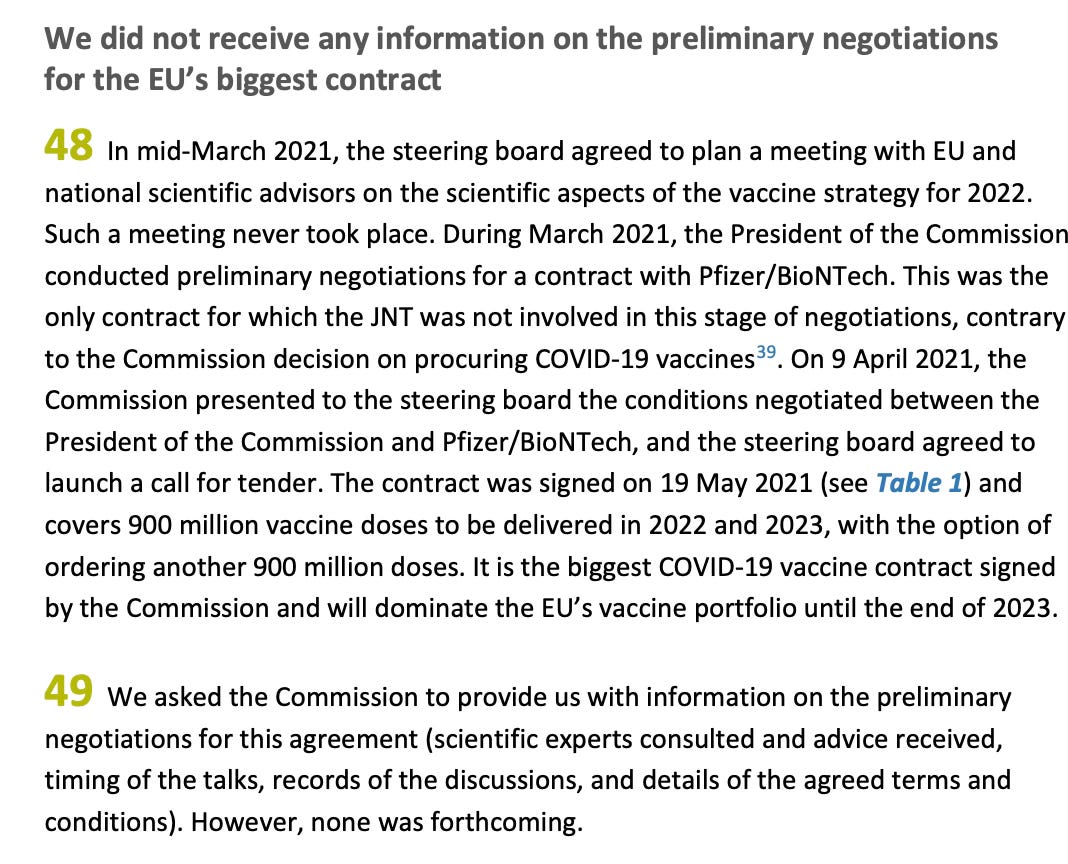Following the SMS Scandal : Von der Leyen Sidesteps EU Negotiators
Whether or not the missing SMS ever come to light, there is no denying that Ursula von der Leyen was at the heart of the EU's agreement with Pfizer. Going so far as to overstep her role –once again.
Ursula von der Leyen didn’t just exchange text messages with Albert Bourla, the CEO of Pfizer. According to the European Commission’s response to The New York Times, those messages —which will likely remain untraceable— were used only to arrange phone calls and were therefore not archived. This conclusion was based on a 2021 review of von der Leyen’s phone by her chief os staff.
Pfizer-BioNTech did not just land the EU’s largest vaccine contract during the COVID-19 pandemic—1.8 billion doses. The company also managed to renegotiate the price per dose. According to unconfirmed sources, the cost increased from €15.50 to €19.50 per dose.
Von der Leyen played a central –and unusually direct– role in these negotiations. She did not limit herself to texting Albert Bourla. She personally intervened in talks with Pfizer, bypassing the official negotiation team and conducting discussions on her own. This was well outside the scope of her formal role.
When the European Court of Auditors request access to records of these preliminary negotiations, the European Commission issued flatly refused in 2022. The state reason : protecting Pfizer’s commercial interests –and perhaps, its own. The Commission also claimed that disclosure could undermine the EU’s position in future contract negotiations.
“We had access to relevant Commission documents –except those concerning the Commission President’s participation in the preliminary negotiations with Pfizer/BioNTech,” noted the European Court of Auditors, which monitors the EU’s finances, noted in a special report.
Preliminary negotiations are critical –they shape the future contract’s termes, including pricing, supply quantities, and liability provisions. Normally, these talks are handled by a designated EU negotiating team made up of Commission officials and a steering committee. But the Court of Auditors found this arrangement lacking.
“The steering committee members were not required to meet any specific qualifications or expertise threshold”, the report stated, raising concerns that the body responsible for overseeing vaccine procurement lacked in necessary competence to navigate the complexity of such contracts.
Meeting minutes from the negotiations are equally sparse. They “rarely detail the points under discussions. '“This is particularly true for the key meeting with Pfizer in March 2021 –the only contract negociations in which the official team played no role whatsoever. This stood in direct contradiction to the Commission’s own procedures for COVID-19 vaccine procurement.
Why was this exception made? What exactly was negotiated, at what cost, and with what concessions? Coincidentally, in that same month, the steering committee had planned a meeting to evaluate the scientific basis of the EU’s 2022 vaccine strategy—a meeting that was never held.
On May 19, Pfizer signed the largest contract among ever negotiated with the European Commission. Von der Leyen defended this deal by citing the company’s superior production capacity. Indeed, production capacity made up 50% of the evaluation criteria –a disproportionately high weight compared to procedures in the UK and the US, where it was more balanced with factors like delivery speed and cost.
Is this the final chapter of the so-called the PfizerGate? The missing text messages may remain lost for good. No judicial authority has ordered a mobile operator to retrieve them, and any attempt to do so now would likely fail –SMS data has a limited lifespan. Von der Leyen’s phone has since been replaced multiple times, and the messages were reportedly erased during successive device resets.
What remains, however, is the controversial nature of how the Pfizer negotiations were conducted –essentially as a solo effort by the Commission President. In April 2023, Belgian lobbyist Frédéric Baldan filed a criminal complaint against von der Leyen for alleged abuse of authority, destruction of public documents, unlawful conflicts of interest, and corruption. Although initially dismissed, the complaint is now under appeal before the Belgian Court of Cassation.
Meanwhile, the European Public Prosecutor’s Office (EPPO)—which as power to request documents such as text messages and even recommend lifting von der Leyen’s immunity– announced in 2022 that it had opened an investigation into the EU’s vaccine procurement process. These proceedings are still ongoing.




